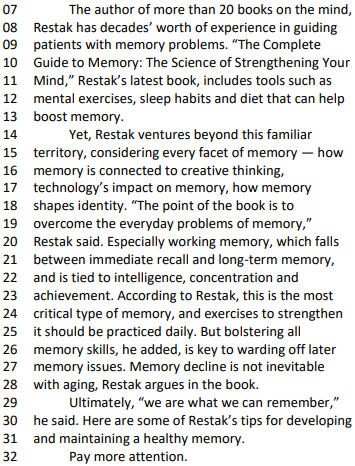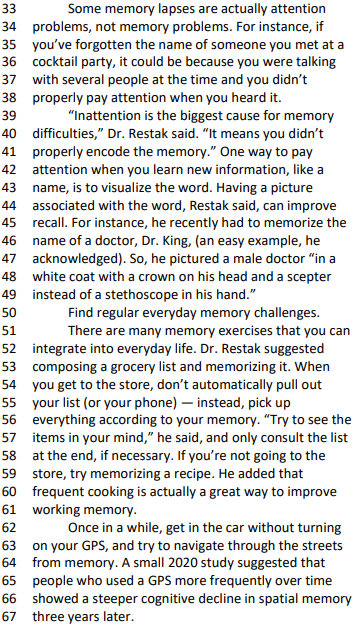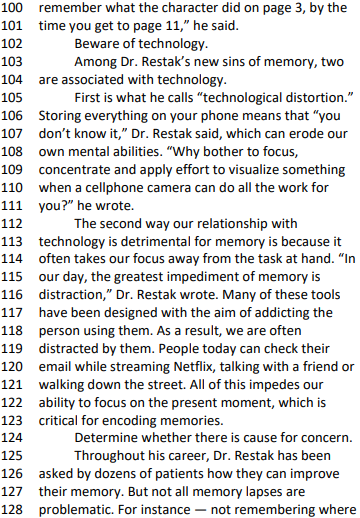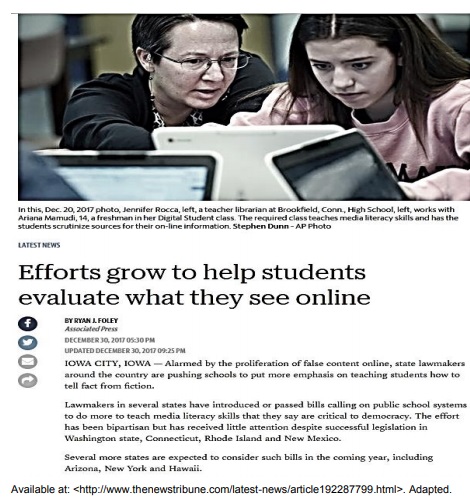Questões de Vestibular
Sobre preposições | prepositions em inglês
Foram encontradas 46 questões









https://www.theguardian.com/environment/
2021/sep/27/
Why do we buy into the 'cult' of overwork?
By Bryan Lufkin, 9th May 2021
Although many of us associate overly ambitious workaholism with the 1980s and the finance industry, the tendency to devote ourselves to work and glamourize long-hours culture remains as pervasive as ever. In fact, it is expanding into more sectors and professions, in slightly different packaging. Overwork isn't a phenomenon exclusive to Silicon Valley or Wall Street. People work long hours all over the world, for many different reasons.
In Japan, a culture of overwork can be traced back to the 1950s, when the government pushed hard for the country to be rebuilt quickly after World War Two. In Arab League countries, burnout is high among medical professionals, possibly because its 22 members are developing nations with overburdened healthcare systems, studies suggest. Reasons for overwork also depend on industry. Some of the earliest researchers on burnout in the 1970s asserted that many people in jobs geared toward helping others, like employees in clinics or crisis-intervention centers, tended to work long hours that led to emotional and physical exhaustion – a trend which is shown up in the pandemic, too. But millions of us overwork because somehow, we think it’s exciting – a status symbol that puts us on the path to success, whether we define that by wealth or an Instagram post that makes it seem like we're living a dream life with a dream job. Romanticization of work seems to be an especially common practice among "knowledge workers" in the middle and upper classes. In 2014, the New Yorker called this devotion to overwork "a cult".
According to Anat Lechner, clinical associate professor of management at New York University. "We glorify the lifestyle, and the lifestyle is: you breathe something, you sleep with something, you wake up and work on it all day long, then you go to sleep. Again, and again and again."
Adapted from: Home - BBC Worklife.
Text 2
Home

No one leaves
home unless home is the mouth of a shark
you only run for the border
when you see the whole city running as well
Your neighbors running faster than you
breath bloody in their throats
the boy you went to school with
who kissed you dizzy behind the old tin factory
is holding a gun bigger than his body
you only leave homewhen
home won‘t let you stay.
No one leaves home unless home chases you
fire under feet
hot blood in your belly
it‘s not something you ever thought of doing
until the blade burnt threats into
your neck
and even then you carried the anthem under
your breath
only tearing up your passport in an airport toilet
sobbing as each mouthful of paper
made it clear that you wouldn‘t be going back.
You have to understand,
that no one puts their children in a boat
unless the water is safer than the land
no one burns their palms
under trains
beneath carriages (…)

I want to go home,
but home is the mouth of a shark
home is the barrel of the gun
and no one would leave home
unless home chased you to the shore
unless home told you to quicken your legs
leave your clothes behind
crawl through the desert
wade through the oceans (…)
No one leaves home until home is a sweaty voice in your ear
saying –
leave,
run away from me now
I dont know what I‘ve become
but I know that anywhere
is safer than here.
By Warsan Shire. Disponível em: https://www.facinghistory.org/educator-resources/current-events/many-faces-global-migration#8 Excertos.
Acesso em: set. 2020.



Available at: www.calendarlabs.com/holidays/brazil/carnival. Accessed on March 25th, 2019
Answer the question below according to Text.


Answer the question below according.
Why so few nurses are men

Ask health professionals in any country what the biggest problem in their health-care system is and one of the most common answers is the shortage of nurses. In ageing rich countries, demand for nursing care is becoming increasingly insatiable. Britain’s National Health Service, for example, has 40,000-odd nurse vacancies. Poor countries struggle with the emigration of nurses for greener pastures. One obvious solution seems neglected: recruit more men. Typically, just 5-10% of nurses registered in a given country are men. Why so few?
Views of nursing as a “woman’s job” have deep roots. Florence Nightingale, who established the principles of modern nursing in the 1860s, insisted that men’s “hard and horny” hands were “not fitted to touch, bathe and dress wounded limbs”. In Britain the Royal College of Nursing, the profession’s union, did not even admit men as members until 1960. Some nursing schools in America started admitting men only in 1982, after a Supreme Court ruling forced them to. Senior nurse titles such as “sister” (a ward manager) and “matron” (which in some countries is used for men as well) do not help matters. Unsurprisingly, some older people do not even know that men can be nurses too. Male nurses often encounter patients who assume they are doctors.
Another problem is that beliefs about what a nursing job entails are often outdated – in ways that may be particularly off-putting for men. In films, nurses are commonly portrayed as the helpers of heroic male doctors. In fact, nurses do most of their work independently and are the first responders to patients in crisis. To dispel myths, nurse-recruitment campaigns display nursing as a professional job with career progression, specialisms like anaesthetics, cardiology or emergency care, and use for skills related to technology, innovation and leadership. However, attracting men without playing to gender stereotypes can be tricky. “Are you man enough to be a nurse?”, the slogan of an American campaign, was involved in controversy.
Nursing is not a career many boys aspire to, or are encouraged to consider. Only two-fifths of British parents say they would be proud if their son became a nurse. Because of all this, men who go into nursing are usually already closely familiar with the job. Some are following in the career footsteps of their mothers. Others decide that the job would suit them after they see a male nurse care for a relative or they themselves get care from a male nurse when hospitalised. Although many gender stereotypes about jobs and caring have crumbled, nursing has, so far, remained unaffected.
(www.economist.com, 22.08.2018. Adaptado.)
TEXTO 01
CAN TECH DELIVER A SUSTAINABLE FUTURE FOR PLANET EARTH?
Sustainability means many things to many people, but it boils down to this: saving Planet Earth.
Mankind1 , as a species, has been too successful for its own good – the global population is estimate to top nine billion by 2050, according to the United Nations Department of Economic and Social Affairs.
As a result, there is already a strain2 on the planet’s essential natural resources, particularly food and water, which population growth can only aggravate.
Meanwhile, our demand for energy has directed to the plundering3 of the earth’s hydrocarbons oil, gas and coal, producing a catastrophic climate change. In a month-long series of features on the theme of sustainability, Technology of Business will be examining the main challenges facing businesses and asking whether technology – which got us into this mess in the first place – can help get us out.
Global megatrends are affecting the business environment
Most companies are already being affected by climate change today, directly or indirectly, says *CDP, a global not-for-profit organization specializing in measuring business environmental impact.
Extreme weather, drought and flooding can disrupt production capacity and affect supply chains for a whole range of businesses. For example, in a CDP survey of 70 European companies, 83% said they had operations in “water-stressed” regions, while 73% said water shortages posed risks to their own operations or those of their suppliers.
Considering an increasingly globalised economy, few businesses can isolate themselves from the impacts of climate change, population growth and resource reduction, says Emma Price-Thomas, head of sustainability strategy at charity Business in the Community.
“The world is changing very fast. Global megatrends are markedly affecting the business environment. If companies don’t address these and think longer-term, they may end up putting themselves out of business,” she argues.
A lot of technology and research is being directed towards reducing water usage an industrial processes and designing products that need less water to work, she says.
*CDP - Carbon Disclosure Project é uma organização que opera o sistema global de divulgação para que investidores, gerenciem seus impactos ambientais
Fonte: WALL, Matthew, BBC NEWS, 2 May 2014. Disponível em: http://www.bbc.com/news/business27208569. Adaptado. Acesso em: 6 abr. 2018.
1 ManKind: Humanidade
2 Strain:Tensão
3 Plundering: Pilhagem
Read the text below.

Read the text below. Fill in the blanks with the right conjunctions.
n today's world, (I) _________ just about everything is more convenient and accessible due to advances in technology across almost all sectors, it may seem (II)_________ it's a misnomer to even mention any disadvantages of technological advances. (III) __________, despite how far technology has taken humans and no matter (IV) ______ convenient it may make things, there are some disadvantages accompanying this level of access.
Technology advances show people a more efficient way to do things, and these processes get results. For example, education has been greatly advanced by the technological advances of computers. Students are able to learn on a global scale without ever leaving their classrooms. Agricultural processes (V)_______ once required dozens upon dozens of human workers can now be automated, thanks to advances in technology, which means cost-efficiency for farmers. Medical discoveries occur at a much more rapid rate, thanks to machines and computers that aid in the research process and allow for more intense educational research into medical matters.
Cost efficiency is an advantage in some ways and a disadvantage in others. (VI) _______ technology improves on existing processes and showcases new ways to accomplish tasks, machines are able to produce the same -- if not more -- output (VII) _______ humans in certain industries. This results in cost savings for business owners, allowing them to invest in growth in other areas of the business, (VIII) _________ contributes on a positive level to the economy as a whole.
Available at: ..smallbusiness.chron.com/advantages-disadvantages-technology-advances-12579.html
Mark the correct alternative.
Opportunity Cost
This phenomenon goes by the name of ‘opportunity cost,’ since by not investing in more equipment and a more rigid production flow, the company is forgoing the opportunity to earn increased profits. These costs are every bite as real as the payment of dollars out-of-pocket.
This notion _______ opportunity cost can be reinforced _________ a famous saying ______ Benjamin Franklin, no slouch himself _________ operations management. To make the point, however, we must make a brief excursion into logic. One truth of logic is the validity of the so-called contrapositive, which says simply that if the statement “If A, then B” is true, then it is also true that “If not B, then not A.” That is, of every time A occurs B follows, then we can be sure that if B does not occur, then A did not occur as well. Enough logic then, and back to Ben Franklin.
One of his Poor Richard sayings is that “A penny saved is a penny earned.” We have all recognized the truth of that since childhood, but I assert that by this saying Ben showed us he knows everything about opportunity cost. After all, what is the contrapositive of “A penny not earned is a penny not saved (i.e., a penny sent). All we are saying by this notion of opportunity cost is that “a penny not earned (an opportunity forgone) is a penny spent.” We shall often have occasion to consider opportunity costs, in analyzing and deciding various operations issues.
SCHMENNER, Roger W. Production/Operations Management. 5th
Edition. Prentice-Hall, 1993.
__________ is your birthday?
It is ________ November.
Great! We ________ celebrate together.
Will human beings ever live on other planets?
(1) __________ we have become accustomed to the idea of space travel, and in films and fiction it seems as tough space travel is inevitable, it appears unlikely that human beings will ever get any further than Mars, our nearest neighbor. No matter how many films we make about space travel, the fact is that it remains technologically challenging, and extremely expensive. (2) __________ the distances involved are immense, any voyage outside the solar system would take hundreds of years using current technology. Wherever human beings went into space, they would have problems of how to eat and breathe, and their spaceship would have to carry vast amounts of fuel (3) __________ cover the distance. Even Mars is so far away that it would take about six months to get there. (4) __________ the distance between Earth and Mars varies, astronauts would have to wait for nearly two years before they could return using the shortest journey time. (5) __________ it could cost as much as $ 100 billion, a manned mission to Mars is planned for sometime between 2010 and 2020.
VINCE, M. Macmillan English grammar in context. Macmillan, London. 2008. p. 165.
Check the CORRECT alternative.
Your gut, your emotions
What controls our emotions? The same two people might see the same tragic newspaper headline, (1) __________ one is much more emotionally affected than the other. Why is that? According to an international team led by UCLA researchers, these emotions may be partially driven by an unlikely source: our gut bacteria. In fact, the bacteria that colonize our intestines may influence the architecture of the brain itself.
The experiment examining the relationship between brain development and the gut microbiome was conducted with mice. Specific strains of mice, one that lacked a complete gut microbiome and one that had a normal microbiome, were compared in terms of their brain development and behavior. The influence of microorganisms is not limited to brain development.
Interestingly, the mice with the ―normal‖ microbiome had more anxiety and moved less than the mice without the microbiome. (2) __________ exposed to a microbiome early in life, the active, calm mice began to act more anxious and reduced their movements. Microbiota evidently had this influence by affecting hormonal expression and building particular pathways in the brain associated with anxiety. The influence on brain development apparently occurred at a particular point early in the mouse‘s life, so it‘s possible early exposure to a proper microbiome is important for normal development. The researchers speculate that the microbiome helps the mice develop an appropriate sense of caution.
The influence of microorganisms is not limited to brain development. (3) __________ no conclusive link has been established, a few studies have detected abnormalities in the gut microbiomes of children with Autism Spectrum Disorders compared to non-affected children. Nor is microorganism influence limited to gut bacteria. A separate study in hyenas (also awaiting conclusive proof) suggests that individual hyenas use a specific cocktail of stinky bacteria in their scent markers left as a message to other hyenas.
(4) __________ some fungus can get in on the act, hijacking ants and forcing the unfortunate insects to relocate to a place favorable for a fungus to grow. The ant does not survive, but it makes great fungus food. (5) __________ a growing body of evidence from other animals, until the UCLA study there was not much direct research on how the microbiome affects humans. But given its potential importance, hopefully there will soon be more research along these lines. Going with your gut, indeed!
Disponível em:< https://daily.jstor.org/your-gut-youremotions/?utm_term=YOUR%20GUT%2C%20YOUR%20EMOTIONS&utm_campaign=jstordaily_08032017&utm_content=e mail&utm_source=Act-On+Software&utm_medium=email>. Acesso em: 15 Set. 2017.
Check the CORRECT alternative.


